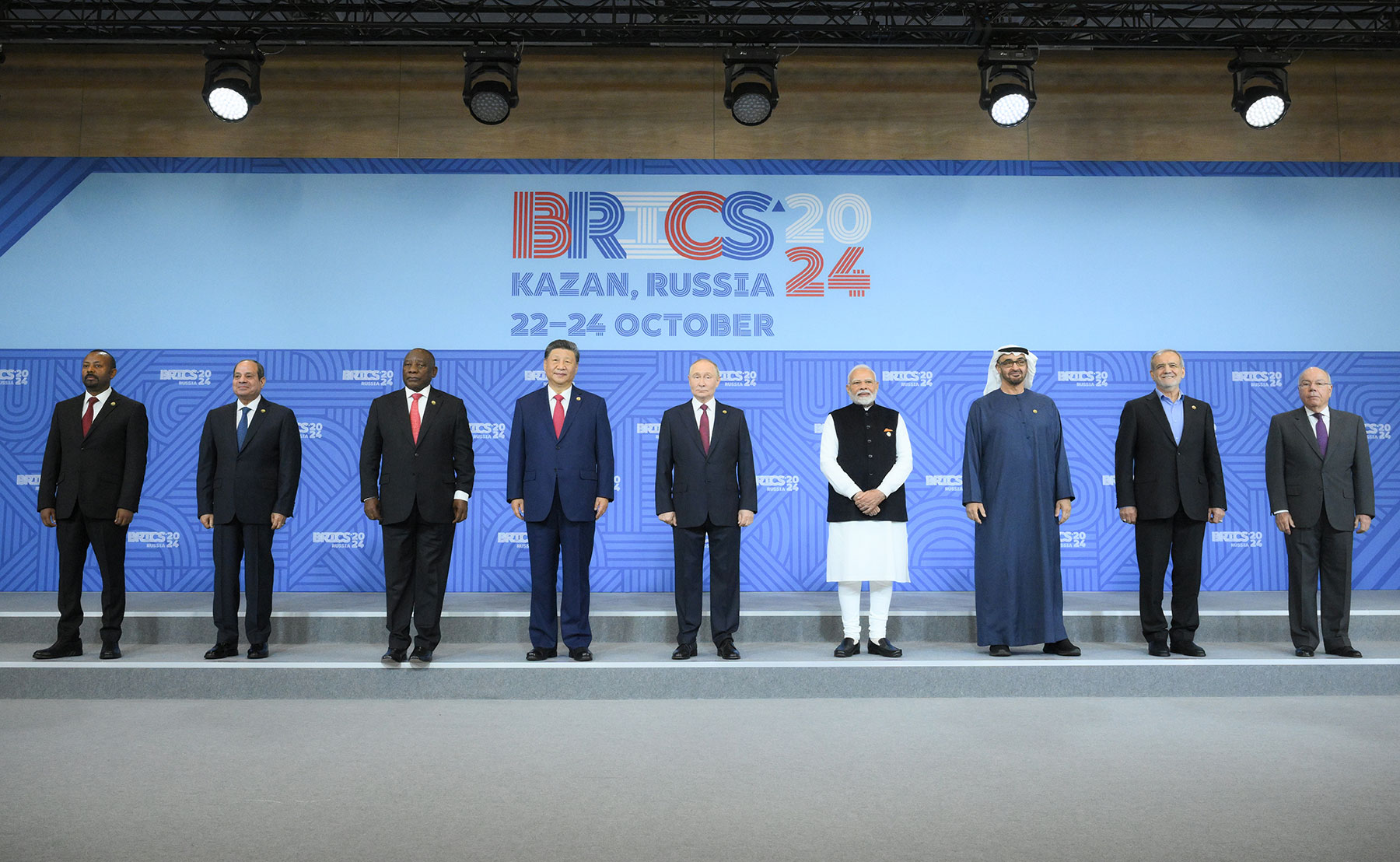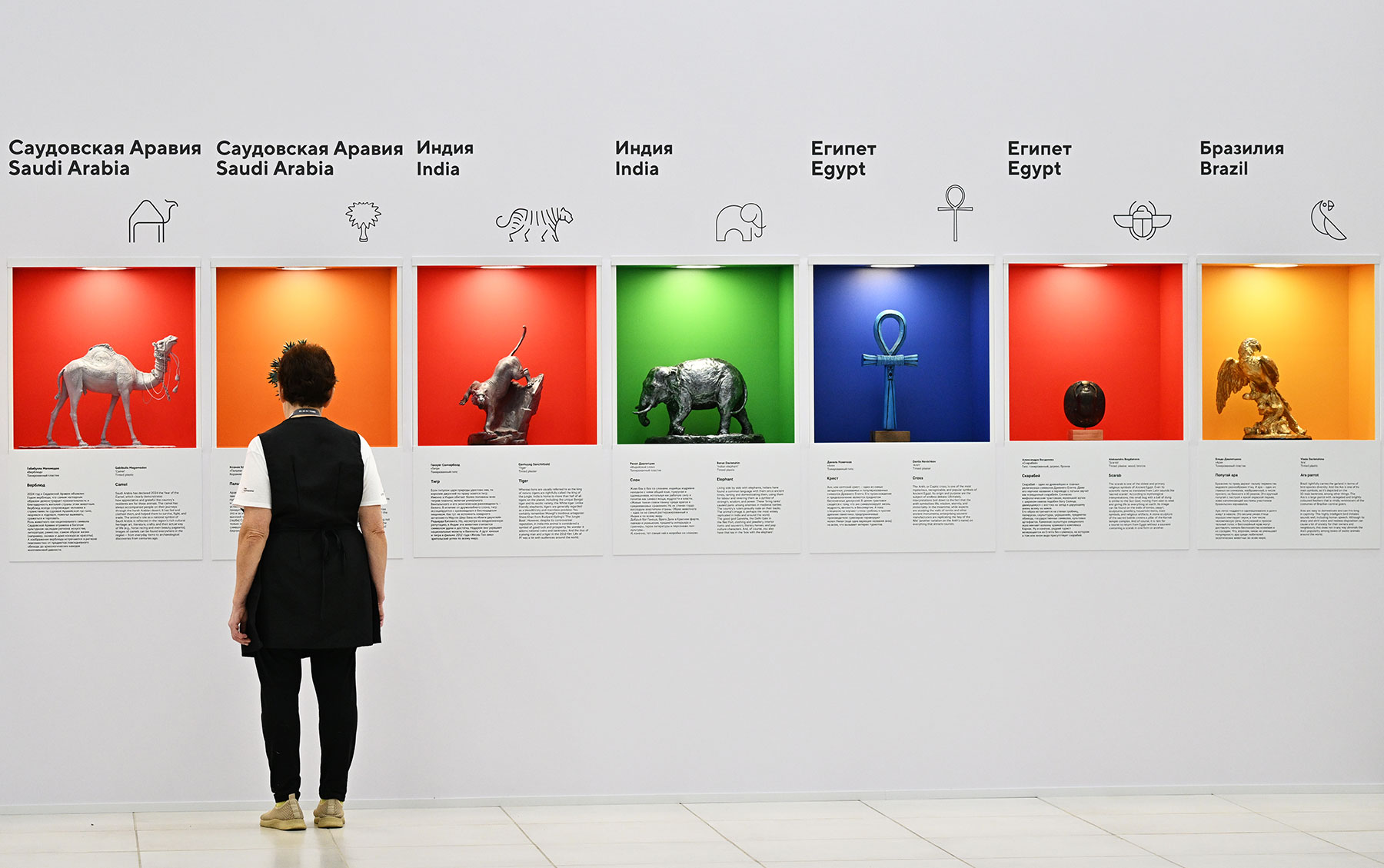The world is at a crossroads: on the one side, there are forces supporting a multipolar world, striving for a fair and equality-based system, and on the other side, hegemonic forces push the world to be divided into blocks by erecting walls. In this context, the importance of the SCO and BRICS has been multiplied. They have become the torchbearers of a multipolar world to create a fair, just, and equality-based system that ensures respect for diversity and sovereignty and believes in everyone's dignity and right to prosperity.
Therefore, the ongoing BRICS Summit has gained huge traction worldwide. The momentum and centrism of the media and export community reminds us of the old days of the G-7 or G-77. The world is closely watching the Summit and its outcome. Policymakers and experts agree that the summit's outcome will significantly determine the future growth patterns of the global economy and power landscape. It clearly indicates that BRICS is a global entity and a reality, and the Global South is consolidating its role as a future leader. However, BRICS member states must remember that with great power comes great responsibility; if you fail to take responsibility, power will diminish and vanish, regardless of how powerful you are. Therefore, BRICS member states need to be cautious and focus on universal peace and prosperity.
All in all, to play a positive and powerful role, BRICS needs to focus on two areas. First, BRICS and the SCO should remain focused on promoting multipolarity and denounce any efforts to make BRICS a block. Second, the world is in an age of mass social exchange; communication determines the success or failure of any country or organisation. The importance of communication has multiplied with the introduction of the post-truth political era. Therefore, BRICS must devise a comprehensive communication policy that meets the needs of the time.
French philosopher Voltaire once said, “the Holy Roman Empire was neither holy nor Roman, nor an empire”. Adopting this logic, the fading global liberal order (GLO) may be defined similarly; it is neither global, nor liberal, nor orderly. The GLO is not global, as it protects the interests of the few by assisting in the rise of a hegemony and unipolar world order. The order exploits weak but resource-rich nations by colonizing them, providing certain states with opportunities to impose an ideology and values on others. It is not liberal, as it does not allow weak countries to choose their own paths towards democracy, as well as general governance and the economy. The order is the weakest link in the whole system; it only takes one look to see that there are numerous conflicts and disputes all around the world.
Unfortunately, those in power in the GLO could not overcome their sense of superiority after their decisive victory in World War II. They forget their alluring promises and eloquent rhetoric, such as economic and social development, equality, inclusivity, respect for dignity, respect for sovereignty, and rule-based global governance and security. In fact, they even started to defy their own principals and system.
This was first done when the US initiated bloc-building and a bloc mentality by alienating its old WWII allies, namely the USSR. The Marshall Plan is a prime example of this; it was implemented in Europe with the goal of excluding the USSR. In fact, the USSR was even made an adversary, and was considered a potential threat, sowing the seeds of discord and the Cold War, which would later engulf hundreds of thousands of human lives and sharply divide the whole world into two.
Second, the US used a liberal economic system and Bretton Woods institutions to colonize economies. They entrapped many countries into debts and compelled these states to obey US and ally orders. On the other hand, resources-rich countries, like many African countries, were forced to open their economies to the military-industrial complex and US and ally multinational companies. Resources were exploited and host countries were left to deal with extreme poverty, rampant crimes, and many other social ills. Moreover, WTO-like organizations were created to capture the markets of weak economies in the name of openness and competition. However, after the rise of China and other economies, many GLO powers have reverted to protectionist measures and “my country first” slogans.
Third, the US and its allies invented liberal democracy and their version of human rights so that they may use it to interfere in other countries and undermine their sovereignty. They also waged senseless wars to promote their models of governance and human rights in the name of liberal democracy. Many Latin American, Asian, and African countries became victims of this policy.
Meanwhile, with the tragic fall of the USSR, GLO powers used it as an opportunity to further exploit the world, accelerating their efforts. Weak and resource-rich countries were particularly targeted. It is pertinent to highlight that during the Cold War, the US and its allies used the mask of values, democracy, human rights, sustainable development, etc., to attract weaker countries to the GLO. With the collapse of the USSR, the US and its allies took off their masks and started to dictate the world to follow them. Simultaneously, Western powers promoted theories like “the End of History” and the “Clash of Civilizations” to strengthen their control further.
These theories portrayed the West as the ultimate winner and superior civilisation. They drafted a new world agenda—keeping their ideology, culture, and needs at the centre—and presented it as the only viable solution and the only way forward for humanity. They pushed countries to imitate Western governance, development, culture, and economic model. If anyone refused to imitate the Western model, the West used sanctions to kill off investment and economic opportunities of those countries.
Russia and China foresaw this situation much earlier than other countries and started to raise their concern and advocate for alternative methods. They rejected unipolarity and advocated for a multipolar world. President Boris Yeltsin was the first to call for a multipolar world while visiting China for the Shanghai Five meeting in 1996. Later, in 1997, the Joint Declaration on Multipolarity in the World and the Establishment of a New International Order was signed between China and Russia to pursue the goal of a multipolar world. Since then, both countries have worked together to create a new system—a multipolar world order. President Putin and President Xi have further accelerated these efforts, and now Russia and China have become the spokesmen of the multipolar world.
Over time, China and Russia upgraded the Shanghai Five into the Shanghai Cooperation Organization and created BRICS. However, Russia and China are convinced that in order to build a global order that could deliver peace, development, respect for dignity, and ensure sovereignty and fairness, the order must focus on five areas: 1) Economy, 2) Security, 3) Development, 4) Environmental Protection and 5) Respect for Civilizations and Culture. For this reason, numerous initiatives have been launched such as the Belt and Road Initiative, the Eurasian Economic Union, the Global Civilization Initiative, the Global Security Initiatives, the Commonwealth of Independent States, etc.
Unfortunately, Western forces have launched new efforts to reverse the process of multipolarity by initiating multiple initiatives. On the one hand, they began to create new blocks, such as the QUAD, AUKUS, and the Partnership for Global Infrastructure and Investment. These blocks are exclusive in nature and are created with two goals. First, to weaken the Global South and those supporting multipolarity, and second, to divide the Global South. This goes in line with the Western philosophy of divide and rule.
Second, hegemony must be maintained by any means or at any cost. For that purpose, the US and its allies have intensified their efforts to build walls by starting trade wars with China, Russia, and other global players. They are also devising and implementing policies like CHIPS and the Science Act to curtail opportunities for Southern countries and companies. These practices are against the spirit of globalisation, free markets, openness, and the WTO, but Western states insist on continuing them.
In response to rising pro-multipolar sentiments, the US and its allies have accelerated their efforts to penalise countries that do not follow their agenda. For example, Pakistan has recently faced the worst consequences of this policy. They are using financial institutions such as the IMF and the World Bank and watchdogs like the FATF to punish Pakistan for not curtailing the China–Pakistan Economic Corridor and its relationship with China and other Global South countries.
The world is at a crossroads: on the one side, there are forces supporting a multipolar world, striving for a fair and equality-based system, and on the other side, hegemonic forces push the world to be divided into blocks by erecting walls. In this context, the importance of the SCO and BRICS has been multiplied. They have become the torchbearers of a multipolar world to create a fair, just, and equality-based system that ensures respect for diversity and sovereignty and believes in everyone's dignity and right to prosperity.
Therefore, the ongoing BRICS Summit has gained huge traction worldwide. The momentum and centrism of the media and export community reminds us of the old days of the G-7 or G-77. The world is closely watching the Summit and its outcome. Policymakers and experts agree that the summit's outcome will significantly determine the future growth patterns of the global economy and power landscape. It clearly indicates that BRICS is a global entity and a reality, and the Global South is consolidating its role as a future leader. However, BRICS member states must remember that with great power comes great responsibility; if you fail to take responsibility, power will diminish and vanish, regardless of how powerful you are. Therefore, BRICS member states need to be cautious and focus on universal peace and prosperity.
All in all, to play a positive and powerful role, BRICS needs to focus on two areas. First, BRICS and the SCO should remain focused on promoting multipolarity and denounce any efforts to make BRICS a block. Second, the world is in an age of mass social exchange; communication determines the success or failure of any country or organisation. The importance of communication has multiplied with the introduction of the post-truth political era. Therefore, BRICS must devise a comprehensive communication policy that meets the needs of the time.






